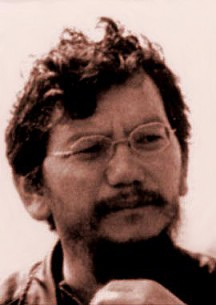Last updated on September 23, 2016
- Part 1 – Origins and Buddhism
- Part 2 – Neon Genesis Evangelion
- Part 3 – Hideaki Anno and The Culture Gap
- Part 4 – Final Fantasy and Psychological Deception
So, on the one hand, we can see Neon Genesis Evangelion as a treatise on Buddhist ethics, surely. On the other hand, we can call it the “pop philosophy” version of that way of life. That doesn’t mean, though, that it didn’t have its effect on Japanese youth. Its melodrama (seeming, anyway!), symbolism, and connection with disheartened and depressed Japanese teenagers turned the show into a smash hit, capturing a zeitgeist no one even knew was there. Even now, the series continues to escalate in popularity AND found itself in multiple remakes into a series of films! By all means, we can’t discount how this affected Japanese pop culture to its core. Should it surprise you that Final Fantasy VII liberally cribs from its themes, its focus on technology, and the angst that comes along with it? Final Fantasy extended it into video games (albeit with much more hope and Hironobu Sakaguchi’s distinctive influence).

Who directed the series, then? Hideaki Anno, the director of the series, remains important to understand this phenomenon. Hideaki Anno works at Gainax, a Japanese animation studio that gave life to such series as Gunbuster , also directed by Anno. However, Nadia: Secret of the Blue Water gave birth to the postmodern style of Neon Genesis Evangelion. During this project, his corporate overlords provided Anno with very limited creative control over the entire work; as a result (in his mind), he fell into a four year clinically diagnosed depression. Paying tribute to his own personal experiences, Neon Genesis Evangelion became a sort of artistic catharsis that integrated this experience into anime. Anno stated that
Evangelion is my life and I have put everything I know into this work. This is my entire life. My life itself.
Clearly, that personal emotional connection comes through quite clearly. But, of course, we also find him saying that Neon Genesis Evangelion doesn’t have any particular meaning at all, so take that with a grain of salt. Time changes people. Whether you want to call its current meaning “postmodernist” or not remains up to you. To the Hideaki Anno of Neon Genesis Evangelion’s genesis, it certainly contained a specific meaning. He believed that
I wrote about myself. My friend lent me a book on psychological illness and this gave me a shock, as if I finally found what I needed to say.
He even relates himself to Shinji, saying that
Shinji does reflect my character, both the conscious and unconscious parts.
He refused to pigeonhole his characterizations and world into a bright and happy world of yore, instead creating an animated series that represented real life. He desired to explore
what the human mind is all about inside.
We might, furthermore, say that Anno did not intend the series with a specific meaning:
Evangelion is like a puzzle, you know. Any person can see it and give his/her own answer. In other words, we’re offering viewers to think by themselves, so that each person can imagine his/her own world. We will never offer the answers, even in the theatrical version. As for many Evangelion viewers, they may expect us to provide the ‘all-about Eva’ manuals, but there is no such thing. Don’t expect to get answers by someone. Don’t expect to be catered to all the time. We all have to find our own answers
Though Anno is not particularly religious, Buddhism’s affect on Japanese culture seems precedent enough to suspect its influence. There is no specific Buddhism referenced in anime for the most part (Zen is not that important to most Japanese people, quite honestly), yet the general principles still affect many deep-seated Japanese traditions.
Religion in Japan unifies the populace Japan. Citizens of Japan, both local and gaijin alike, are expected to conform to societal norms and authorities; rebellion and nonconformity are not hallmarks of the culture. Whether or not you think this a good or bad thing, there’s a distinct rejection of individual importance over that of the whole society. Each person remains essential to the whole, and eventually most people will assimilate into this collective unconscious cultural experience. Or, so we might say, anyway.
The other side of the coin comes from those not willing to conform to these standards. I am not trying to typecast here, but most people consider otaku as these “rejects” and pariahs of Japanese society; this could apply to any bizarre subculture. One’s hobbies could vary and range from anything, but your personal expression remains a private matter, similar to religion in the West. However, Japanese culture slowly undergoes erosion by the continued Westernization of Japan, which has allowed two diametrically opposed forces to emerge: one that emphasizes individuality, and the other which emphasizes community.
We also see a culture of success and achievement slowly creep its way into that culture by way of American free enterprise. On one level, economic development and freedom force the concepts of individual responsibility and performance, neither of which existed Japanese culture until the last hundred years. It developed uniquely and distinctively in Japan to integrate both, with vastly different results. After World War II, what choice did they have?
In both school and the workforce, Japanese trends work according to a system known as the Deming Cycle. Named after an American statistician named W. Edward Deming, the Deming cycle involves never setting a standard for the quality of one’s work. This means, in layman’s terms, that an employee or a school student should continually strive to beat their own best, continually improving in the process. But, of course, this comes with its own caveats; this doesn’t just mean “keep working until it’s better”; it means keep working forever. You will never hit that precise standard of quality, and certainly not before your boss/parents tell you that you can stop. Taking into account the considerable respect for superior and elders in Japanese culture (honorifics and all that jazz), and how horribly impolite/wrong it is perceived to stop working before you are told or allowed to stop, you’ve got a recipe for a work philosophy that means you never stop working.

Some find it fulfilling in a cultural sense to work towards a better standard for the company/society; others reject this and assert their own individuality against a culture of “success”. Those in the latter category find themselves categorized as distant loners and outcasts who reject cultural norms. I suppose that accounts for the depression, no?Anno’s desire to depict this theme comes not only from his personal experiences, but a desire to explore the Japanese educational system he saw as flawed. The Japanese school system is heavily saturated with the concept of success, with negative results:
Contemporary Japanese youth face not only the social pressure of excelling academically and getting into ‘good schools,’ but also, the problem of alienation from the end results of their efforts. After all the effort put into getting into the ‘good schools,’ there is little in the way of tangible returns, and the most likely course of the rest of their lives will involve more work at the good school to get into a good college, more work at college to get a good job, and from their, an endless cycle of labor once one enters the workforce. With so much pressure to succeed, it is not particularly surprising that social commentary on the plight of the youth would begin to show up.
Alexander Dumas Jesse Brickler IV (I guarantee you this is a fake name), Psychosocial Apocalypse: A Paradox of Maturation Theories in Neon Genesis Evangelion, Can’t We All Just Get Along?
It is this society that Anno was raised within, feeling the same overwhelming pressure from a society of free enterprise not only to succeed in terms of business but in personal relationships. This alienation makes Shinji Ikari a representative of the typical Japanese adolescent. Though in Shinji’s case, he must reluctantly pilot a giant creation of death and destruction, the lessons still apply. In the same way, this drive to succeed might ultimately be the downfall of people. The monkey mind schemes and drives them ever onward to success, when these successes are only temporary in the grand scheme of life. If humans would take the chance to slow their lives to a halt and realize that, perhaps, their goals are not only insignificant but for naught, they would realize the suffering that they cause.
There is no end to the cycle of capitalism – when is enough money made, or enough success gained? Hideaki Anno channels the experience of Japanese youth into his protagonist not only to expose the supposed dissatisfaction of their endless pressure to succeed, but rekindle the Buddhist conception of suffering. Though Buddhism has had great influence within Japan’s borders, its influence has gone by the wayside during the post-World War II years – The famous (in Japan, anyway) saying “Born a Shinto, married a Christian, died a Buddhist” exemplifies this diluting of tradition.
Whatever the true conclusion of Evangelion, it is difficult to deny the influence of Buddhism within its philosophical, religious, and scientific content. Not only does it show a culture trying to cope with new ideas, but the successful syncretic nature of Buddhist thought. The series’ constitutes remarkable look into the Japanese psyche, and a decidedly Buddhist outlook on the solution to life’s problems. Though Evangelion doles out its concept of suffering with nearly every horrific sight it shows the audience unflinchingly, a positive Buddhist conception of reality remains its foundation.
So it is that we finally understand the oppositional forces that created this “emo” narrative in video games.
